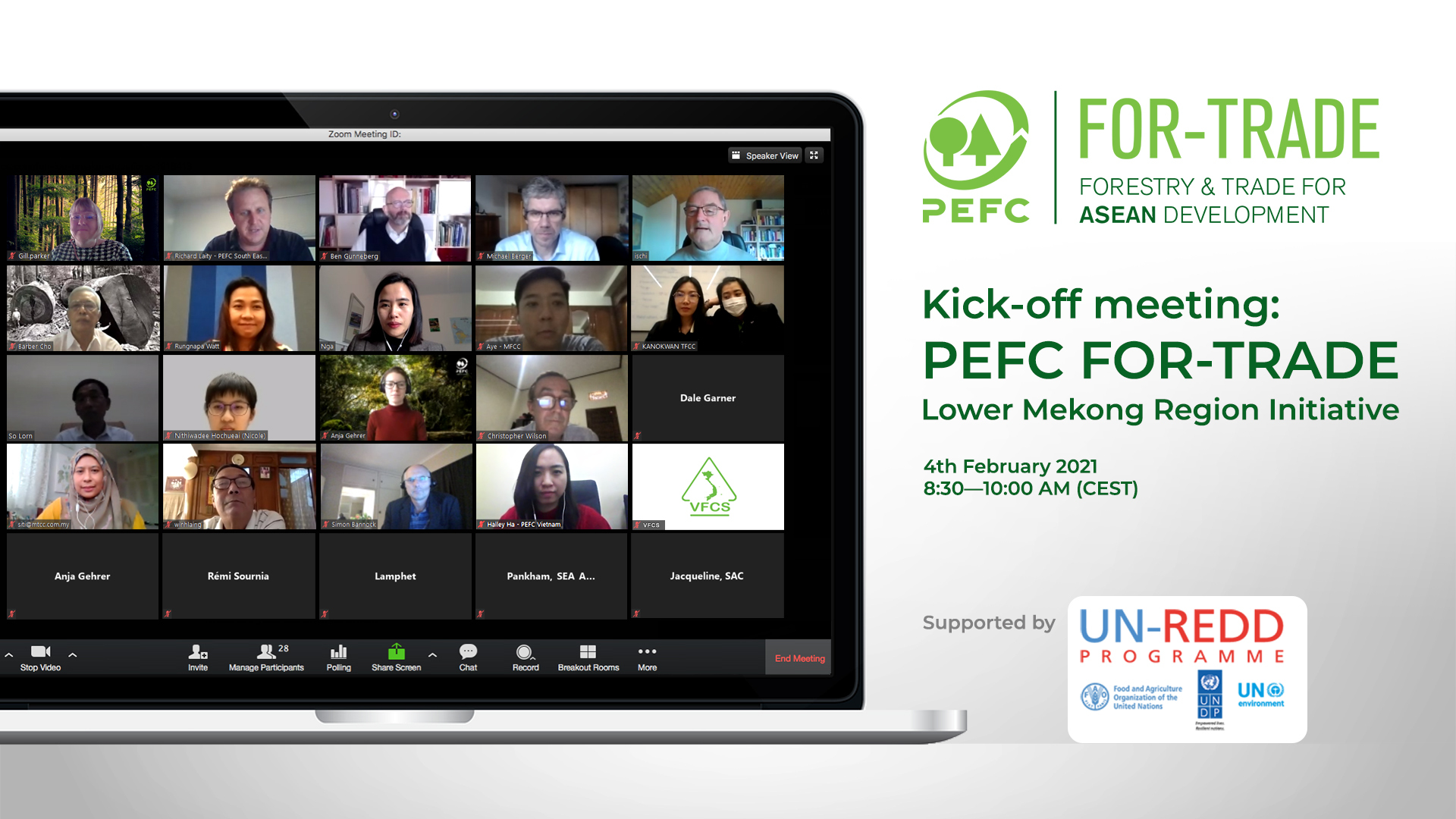PEFC FOR-TRADE project partners with UN-REDD to support sustainable and legal forest trade in the Lower Mekong Region
The PEFC FOR-TRADE initiative is now working with the UN-REDD Programme as a key partner for their newly launched initiative.
PEFC FOR-TRADE project partners with UN-REDD to support sustainable and legal forest trade in the Lower Mekong Region
23 February 2021 Driving innovation
We are pleased to announce the launch of a new PEFC FOR-TRADE project, in collaboration with the UN-REDD Programme’s initiative for the Lower Mekong.

The PEFC FOR-TRADE initiative stands for Forestry and Trade for Development in the ASEAN region. It aims to strengthen trade through the institutionalization of forest certification infrastructure, supporting the reduction of trade barriers, promoting sustainable wood trade, improving livelihoods, and contributing to biodiversity protection.
The PEFC FOR-TRADE initiative is now working with the UN-REDD Programme as a key partner for their newly launched initiative "Sustainable Forest Trade in the Lower Mekong Region (SFT-LMR)."
The aim of the SFT-LMR initiative is to promote trade and sustainable forest management (SFM) and reduce pressure on forests through improved governance in Cambodia, Lao PDR, Myanmar, Thailand, and Vietnam.
The SFT-LMR initiative is implemented by FAO and UNEP, with funding from the Government of Norway. Key outcomes include the development of national forest certification systems and related quality infrastructure mechanisms.
The PEFC framework will be used to deliver several outputs, that include deepening intra-regional cooperation, strengthening national certification standards, and building national capacities in forest governance, sustainable forest management, and trade.
Starting the collaboration

To launch the project from PEFC’s side, PEFC organized the kick-off project meeting, which took place on 4 February. There were representatives from key project partners in five project focused countries and other broader partners at ASEAN and Asia-Pacific levels.
The launch was the first step in building a close collaboration between PEFC and project partners to implement expected activities and deliverables within the project time frame.
“The Lower Mekong region is one of the critical hotspots in need of biodiversity preservation and livelihood improvement," said Ben Gunneberg, CEO of PEFC International.
"I firmly believe that a strong forest governance and institutionalization at regional and national levels to promote sustainable forest trade is a critical solution. The PEFC framework is proven to contribute to such a goal, and we are calling for more of such support to deepen intra-regional cooperation."
"It's an excellent and timely opportunity to leverage the quality infrastructure of internationally recognized forest certification systems at the regional and national levels in the Lower Mekong region," added Michael Berger, Head of Technical Unit at PEFC International.
"We are looking forward to providing technical support and deepening intra-regional cooperation to improve regional certification infrastructure."
Mr Sakchai Unchittikul, Chairman of TFCC, noted that the project components corresponded well to Thailand’s critical need to strengthen national forest certification capacity to achieve international recognition, and that this was another useful activity in PEFC’s “tireless supported of Thailand Forest Certification Council (TFCC)” Mr Sakchai Unchittikul said that TFCC was “ready, and look for the cooperative collaboration between project partners to deliver and go beyond the project’s expectations”.
More information about the PEFC FOR-TRADE project’s work with the UN-REDD Programme can be found below:
***
The UN-REDD Programme is the United Nations Collaborative Programme on Reducing Emissions from Deforestation and forest Degradation (REDD+) in developing countries. The Programme was launched in 2008 and builds on the convening role and technical expertise of the Food and Agriculture Organization of the United Nations (FAO), the United Nations Development Programme (UNDP) and the United Nations Environment Programme (UNEP). The Programme supports nationally led REDD+ processes and promotes the informed and meaningful involvement of all stakeholders, including indigenous peoples and other forest-dependent communities, in national and international REDD+ implementation. Additionally, the programme supports national REDD+ readiness efforts in 65 partner countries spanning Africa, Asia-Pacific and Latin America.
More information and news about the REDD the SFT-LMR initiative can be found at https://www.un-redd.org/lowermekong